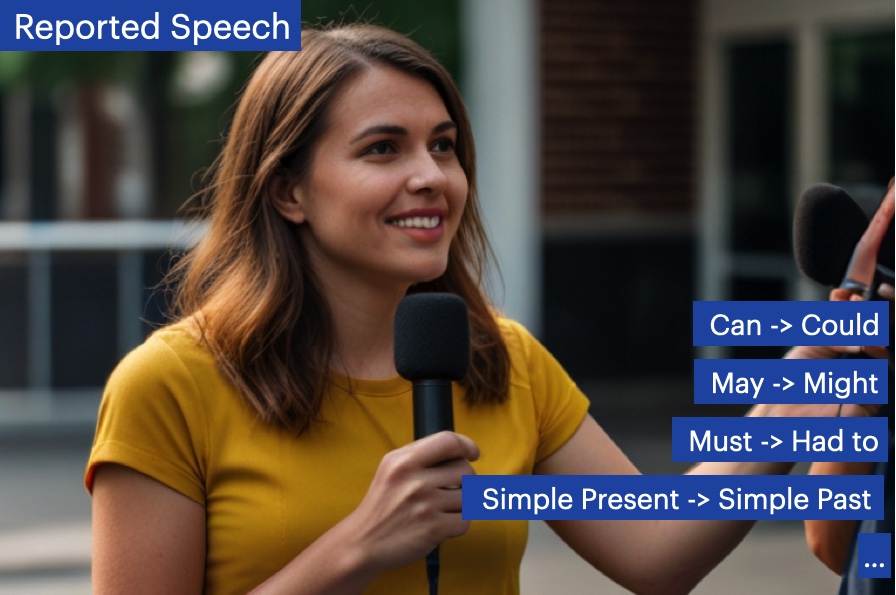Reported speech, also known as indirect speech, is used to convey what someone else has said without quoting their exact words. It is an essential aspect of English grammar, helping to relay information accurately and smoothly. Here’s a detailed look at how it is used, when it is used, and some examples to illustrate its application.
How It Is Used
In reported speech, the structure of the sentence changes compared to direct speech. Pronouns, verb tenses, and time expressions are often modified to fit the context of the reporting.
Changes in Pronouns
Pronouns are adjusted according to the perspective of the person reporting the speech.
- Direct: She said, “I am happy.”
- Reported: She said that she was happy.
Changes in Verb Tenses
Verb tenses are usually shifted back in reported speech. This is known as backshifting.
- Direct: He said, “I will go to the store.”
- Reported: He said that he would go to the store.
Changes in Time Expressions
Time expressions are modified to reflect the time at which the reporting is taking place.
- Direct: She said, “I will do it tomorrow.”
- Reported: She said that she would do it the next day.

From “Direct Speech” to “Reported Speech” Table
This table demonstrates how to convert direct speech into reported speech in English. It highlights the changes in verb tenses that occur when transforming statements from direct to reported speech.
| Direct Speech | Reported Speech |
|---|---|
| Simple Present | Simple Past |
| “I am happy.” | He said (that) he was happy. |
| Present Continuous | Past Continuous |
| “I am working.” | She said (that) she was working. |
| Present Perfect | Past Perfect |
| “I have finished.” | He said (that) he had finished. |
| Present Perfect Continuous | Past Perfect Continuous |
| “I have been waiting.” | She said (that) she had been waiting. |
| Simple Past | Past Perfect |
| “I went home.” | He said (that) he had gone home. |
| Past Continuous | Past Perfect Continuous |
| “I was reading.” | She said (that) she had been reading. |
| Past Perfect | Past Perfect |
| “I had eaten.” | He said (that) he had eaten. |
| Future (will) | Would |
| “I will call you.” | She said (that) she would call me. |
| Future (going to) | Was/Were going to |
| “I am going to start.” | He said (that) he was going to start. |
| Future Continuous | Would be |
| “I will be working.” | She said (that) she would be working. |
| Future Perfect | Would have |
| “I will have finished.” | He said (that) he would have finished. |
| “can” | “could” |
| “may” | “might” |
| “must” | “had to” |
When is Reported Speech Used
Reporting Statements
Reported speech is commonly used to relay statements made by others.
- Direct: “I love chocolate,” she said.
- Reported: She said that she loved chocolate.
Reporting Questions
When reporting questions, the sentence structure changes from a question form to a statement form.
- Direct: “Where are you going?” he asked.
- Reported: He asked where I was going.
Reporting Commands and Requests
Commands and requests are reported by using the infinitive form of the verb.
- Direct: “Please close the door,” she said.
- Reported: She asked me to close the door.
Test your English level now
Answer 40 questions and find out your English language level confortably in around 20 minutes.
Reported Speech Examples
Statements
- Direct: “I am studying English,” he said.
- Reported: He said that he was studying English.
Questions
- Direct: “What time does the train leave?” she asked.
- Reported: She asked what time the train left.
Commands
- Direct: “Finish your homework,” the teacher said.
- Reported: The teacher told the students to finish their homework.
Reported Speech Exercises
Convert the following direct speech into reported speech:
- Direct: “I am going to the market,” John said.
- Direct: “Do you like ice cream?” she asked.
- Direct: “Please help me,” he said.
- Direct: “We will meet you there,” they said.
- Direct: “Why are you late?” the manager asked.
Answers
- Reported: John said that he was going to the market.
- Reported: She asked if I liked ice cream.
- Reported: He asked me to help him.
- Reported: They said that they would meet me there.
- Reported: The manager asked why I was late.
Understanding reported speech is vital for effective communication, especially in written and formal contexts. By mastering the rules and practicing with examples, you can accurately convey what others have said.





